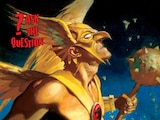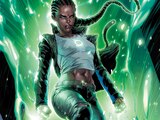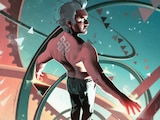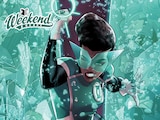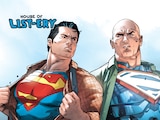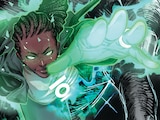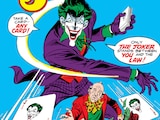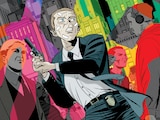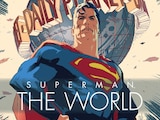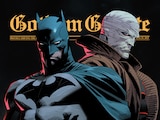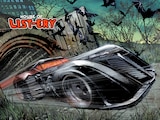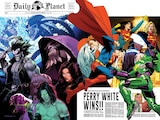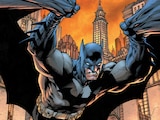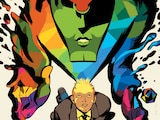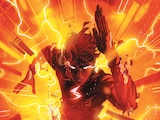DC’s Legends of Tomorrow has just wrapped up their seventh spectacular season and treated the fans to more than a few surprises along the way. After a battle with the evil version of Gideon and a reluctant forced retirement designed to save the timeline, tonight’s season finale pitted the team against Booster Gold, who was brought to life by the talented Donald Faison. News of Faison’s casting was announced in February, and while there had been teases, who he was actually playing had been largely kept under wraps. In other words, if you were surprised, you weren’t alone! So, to help break down Booster’s arrival, and what it means for the Legends, we sat down for a chat with showrunner Phil Klemmer.

I was so happy to see Donald Faison playing Booster Gold.
I wasn't expecting this one either.
Oh, really? Okay, that's interesting and it leads into my first question. In a DC Universe show about time-travelers, it was only a matter of time, no pun intended, before Booster Gold was brought in. What made this the right moment?
None of us were expecting it to happen. I credit DC Creative Director Kim Roberto. I don't know who she strong-armed, bribed, cajoled or charmed in order to get the green light on this. It was beyond our wildest dreams. We wanted to bring out a new character, we wanted to thrill our DC fans, but this was like order of magnitudes beyond what we thought was possible. And then to couple that with the exciting casting news of Donald Faison, it almost makes me want to blush. I'm sure we don't deserve this, but we'll happily take it.
The world doesn't deserve Legends. We haven't behaved enough for a show like this.
(laughs) Oh, I don't know. I don't think you understand the zeitgeist of this show. We feel like we're the unworthy ones. We can't believe that we've been allowed to do this thing for 110 episodes.

Casting Donald Faison was genius. Can you talk about how that came about, and what it was like working with him?
We talked to him, and he gave the normal, “Love the show, love DC Comics.”
Maybe I'm a cynical human being, but I just assumed that everybody in Hollywood always says those things. Within moments, though, it was clear that he is a real fan, and that he's done his homework. It wasn't like he just randomly happened into this show, we came to find out that he's been gunning for this show. It's like a romantic comedy, you know, where you realize that the show's been looking for him, and he's been looking for the show. How did it take almost eight seasons for this to happen? It's like a Julia Roberts movie or something. How did we not get together sooner with this guy?
He's hilarious, he's a gifted actor, and to find out that he geeks out on the same stuff that our fans do. I'm a believer that the spirit in which people do something, whatever the thing is, just infuses it. He's on the screen for something, like, seven or eight minutes maybe in the finale, but for every one of those moments, that guy's not just working, that guy is having a blast. It raises everybody's level when somebody comes in and they love the material, and they raise the material. I can't wait to start writing him, because I feel like we barely got to know this guy.
How familiar were you with Booster before this?
I just knew about him from the early days of Legends, when I would hear of various projects, whether they were TV shows or movies, in the same halls where I was working. And obviously dealing with Rip Hunter in early seasons as well. I just assumed that he was going to have his own project. I never imagined that he would come into our world.

For building this version of Booster, did you draw upon any particular stories? Or did you build him from the ground up?
The creation of a character really takes place over the course of that first season, and then seasons to come. It's going to really be a correspondence between us as writers and Donald as a performer. We definitely wanted someone who is a little off center, and like, a little bit mischievous. But we also just wanted a charisma bomb.
Our work has barely even begun. I feel like, we're going to have to start telling these stories and see where they take us. We haven't even pitched season eight yet, so to say which version of the character we're going to tack towards, I think it might be too soon to say. With every character, I feel like the performer is like part-owner. Like our version of Citizen Steel. In the end it was Nick Zano.
Can you break down the dynamic between Booster and the Legends?
I guess the Legends are maybe a little guileless. I feel like their Achilles heel is maybe being a little too comfortable with the notion that they're superheroes or that they're particularly good at what they do. And I think Booster Gold is a very savvy guy. It’s like the way they talked about Bill Clinton, how he could just walk into a room, and even if he only had ten seconds with every person, every person in the room would walk away feeling like they got exactly what they wanted from that experience. I feel like our Booster has that magical gift of just being able to give people exactly what they need—here's the caveat—in order to get what he wants. And you still love the guy even after he's probably taken you for more than you wanted to give. I can't wait to get to know him.

Spooner recently came to the realization that she's asexual. Can you talk about that moment and how it came about?
It was very organic, and it seemed preordained once it happened. It's a very eerie thing on the show that sometimes things aren't necessarily planned out, but once they happen, and you start looking at the steps that led you, it seems like maybe you were headed there, subconsciously and didn't know it.
I always use that Ouija board analogy when I talk about our writers room. Nobody knows who's moving the little thing around the board. It really appealed to Lisseth Chavez. I think I'd stepped out of the room for a second, and I came back and somebody was like, “Okay, this is a big pitch.” There was a moment of collective consideration, but I loved it and the room loved it. Lisseth read the script, and we talked to her about what we wanted to do with the character, and she loved it as well.
We look forward to consulting with people who can guide us in how to tell the story in an authentic and full way. I also just love that she came out to Zari. I thought that was just such a perfect way for it to happen. To see those two brought closer by the sharing of something personal, it makes me excited.

Legends has been described as the goofy DCTV show, and the one that is allowed to do whatever it wants. How do you see Legends of Tomorrow’s place in the overall DCTV Universe?
I think that it's had a lot of incarnations. I think goofy was one of them, but in a lot of ways, I think we've kind of moved past that.
You always keep an element of your former self. It was pretty serious in the beginning and true to canon, and it became outlandish, it became slapstick, but it's also become earnest and heartfelt. I feel like the goal is for the show to just continue growing. I don't think we have anything uniquely wonderful that other DC shows don't have. The one thing that mechanically the show has is it does have the ability to morph. The fact that characters come and go has allowed us to redefine the show at every opportunity. To just try on different esthetics. I hope there's some coherence in it.
I think a lot of times people tend to highlight the craziest things we've ever done. Like, people use these totems and they create a Beebo, and you wouldn't believe this show. From the point of view of the writers, we're not just trying to come up with absurdity for absurdities sake. We're trying to use it as a tool to highlight the humanity of these characters, which for us it feels very real.
Need to get caught up on DC's Legends of Tomorrow? Stream past episodes and seasons on CWTV.com and Netflix, and on The CW app. And check out our official series page for all the latest news from the Waverider.

